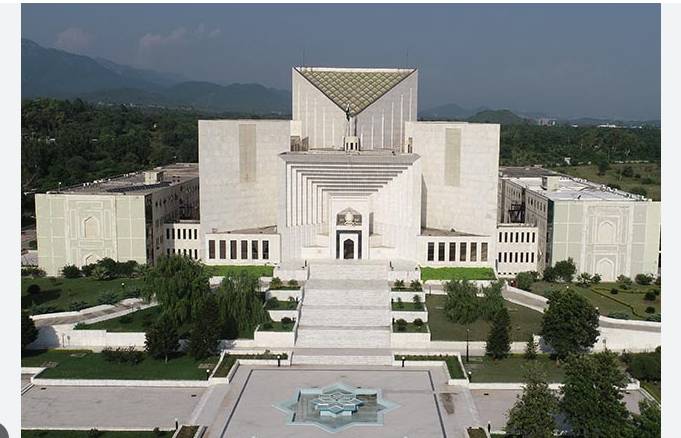Why were APS attackers not tried in military courts, asks SC judge
Justice Mandokhel says amendment had to be made for military trials of APS attack suspects: Asks whether terrorist could be tried in military court: Constitutional bench adjourns hearing until tomorrow

Stay tuned with 24 News HD Android App

Justice Hassan Azhar Rizvi of the constitutional bench of the Supreme Court (SC) on Wednesday asked whether the Pakistan Army personnel retaliated when the May 9 rioters tried to damage military installations, reported 24NewsHD TV channel.
During the hearing of intra-court appeals filed against declaring the trials of civilians in military courts null and void, the judge also asked whether any army officer, found involved in the May 9 incidents of violence, was also tried in a military court.
A seven-member bench, headed by Justice Aminuddin Khan, heard the appeals.
Khawaja Haris, counsel for the Ministry of Defence, replied that the use of force was avoided to save human lives.
Justice Jamal Mandokhel questioned, if any soldier’s rifle was stolen, where would that case be heard?
Haris replied that would depend on the circumstances of that time.
The counsel insisted that courts, in their decisions, had also acknowledged that there existed military courts.
He further said the question was not whether a civilian should be tried in a military court. “The question is the commission of an act, which is an offence under the Army Act.”
Justice Jamal Mandokhel asked whether the intention of the suspect would also be looked into by a military court.
Justice Aminuddin said that the suspect could say during the trial that he did not have the intention to commit the crime.
Concurring with him, Justice Mandokhel remarked that the suspect could say that he did not have the intention.
Haris, however, argued that if an act committed had been declared a crime under the Army Act, it merited a trial in a military court.
Justice Muhammad Ali Mazhar opined that the judge could judge the intention of the defendant during the trial.
Haris, on this occasion, gave the reference of the 21st Amendment.
Justice Mandokhel replied that the amendment was for a specific time period and had been necessitated by special circumstances.
He said that military trials were not possible even in the case of an attack on the Army Public School (APS), Peshawar. “An amendment had to be introduced in the constitution for the purpose.”
Disagreeing with the judge, Haris said that military trials were possible even without an amendment. “The purpose of the amendment was something else,” he added.
He reiterated his stance that the May 9 convicts merited a trial in military courts.
“We recognize the existence of military courts,” Justice Mandokhel remarked.
The judge said there was a mention of defence of Pakistan in one of the court verdicts.
He asked whether the Army Act was there at the time of the APS attack.
The counsel replied, “Yes my lord, both the Army Act and the Official Secrets Act were there at that time.”
The question was, Justice Mandokhel said, why were not APS attack suspects tried in military courts when the Army Act was in existence? “Why was amendment necessary?”
Justice Mandokhel remarked where there would be a trial in case somebody commits acts of terrorism in the name of religion.
Khawaja Haris replied that in incidents of terrorism, there would be a trial in military courts under the Army Act. “Such people can be tried in military courts even without an amendment,” he added.
There was also a mention of the tears shed by former Senate chairman Raza Rabbani who had wept while voting for the 21st constitutional amendment.
“The tears he had shed are part of history,” Justice Hassan Azhar Rizvi said.
Justice Mandokhel remarked that had he not voted, at the most he could have lost his seat.
“Rabbani had later said that his hands and feet were tied,” said the judge.
Haris said that Rabbani had rendered lots of services for the 18th constitutional amendment.
Later the case’s hearing was adjourned until tomorrow.
Reporter: Amanat Gishkori
